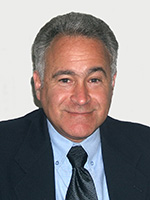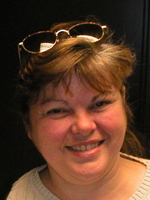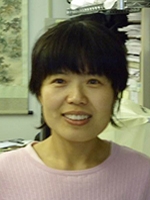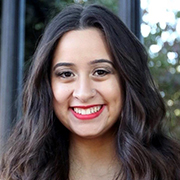The ability to produce a concentrated urine is crucial to kidney longevity and general health. Several diseases are characterized by a break down in this ability. The production of concentrated urine requires complex interactions among the medullary nephron segments and vasculature. A major goal of this lab's research is to identify the cellular and molecular mechanisms that contribute to changes in water and solute homeostasis that occur pathologies that result in concentrating defects.
Nephrogenic diabetes insipidus is the most current area of research in our laboratory. NDI can be congenital or acquired in origin. The congenital form results from x-linked genetic mutations in the type 2 vasopressin receptors in the kidney. The result is that the signaling pathway that activates water reabsorption is disrupted. This causes children, and later adults, to produce a huge amount of urine, up to 20 liters per day. To avoid dehydration and stay in water balance these boys must drink an equal amount of water. Acquired NDI is generally a consequence of therapeutic toxicity, most common of which is Lithium toxicity. Lithium does not influence the vasopressin receptor; however, it also results in a break in the activation pathway to the aquaporins and water reabsorption. One of our major research directions is the study of possible alternative pathways to stimulate water reabsorption in the absence of an active vasopressin receptor.
An ongoing emphasis in our lab is to understand the basic regulation of the urea transporters and Aquaporins by phosphorylation and dephosphorylation in the renal collecting duct. We were the first to prove that phosphorylation of urea transporter UT-A1 resulted in trafficking to the apical membrane surface where it needs to be in order to move urea. Others had shown that Aquaporin is similarly phosphorylated resulting in membrane insertion and activation. While phosphorylation is a key regulatory ingredient, the dephosphorylation of these proteins is also extremely important, yet is understudied due to the complexities arising from the relative promiscuous nature of the phosphatases involved. Another major research direction in our lab is the study of dephosphorylation as it contributes to control of water and urea homeostasis, especially in the situation of SIADH, the syndrome of inappropriate diuretic hormone and vasopressin escape.
Lastly, we have been investigating the basic contributions of the urea transporter to renal and extra-renal tissue fibrosis and are exploring the communication pathways between the kidney other organs. This has resulted in a number of collaborations within the division, in particular with Dr. Xiaonan Wang, looking at the role of microRNAs and their therapeutic potential for chronic kidney disease.
The research into the potential role of AMPK in regulating water homeostasis has resulted in the establishment of a start-up company, NephroDI Therapeutics. The goal of this company is to bring to the clinic an orally administered lead small molecule for treatment of Congenital Nephrogenic Diabetes Insipidus. These children are unable to conserve water and produce up to 20 L/day of urine. They must drink as much water as they excrete to avoid severe dehydration. Dr. Sands and Dr. Klein are company founders.
Visiting scientists who have trained in the lab
- Akihiro Kuma, MD, PhD (University of Occupational and Environmental Health, Japan)
- Fitra Rianto, MD (Haydarpasa Numune Research and Training Hospital, Turkey)
- Orhan Efe, MD (Hacettepe University, Turkey)
- Huiwen Ren, PhD (Peking University (formerly), currently Tianjin, China)
- Juan Wang, MD (Tongji University, Shanghai, China)
- Ling Chen, MD (Zhongnan Hospital of Wuhan University, Wuhan, China)
- Wei Lu, MD (Xinhua Hospital, School of Medicine Shanghai JiaoTong University)
- Rong Zhou, MD (Yangpu Hospital Tongji University)
- Denise Pereira Dos Santos, MD (Brazil)
- DungUn Kim, MD (Seoul, Korea)
Students who have trained in the lab and their later careers
- Titilayo Ilori (MD Assistant Professor, Boston University, Renal Division)
- Ray Keller (ASN Research Scholar, Medical Student, University of New England College of Osteopathic Medicine)
- Dyanna Fountain (Visiting Medical Student, Morehouse School of Medicine)
- Joseph Ruiz (Research Specialist, now a Medical Student, MCG)
- Katherine Pohl (SURE Student, Research Specialist)
- Randy Gertner (MD Fellow, Private Practice)
- Benjamin Nanes (Undergraduate Research, MD/PhD Resident, UT Southwestern)
- Monica Hokanson (Undergraduate Research, MD specializing in Obstetrics)
- Barbara Gafford-Hampton, PhD (APS Teacher Research Experience, Science Teacher)
- Nathan Blessing (Undergraduate Research, Honors Thesis, MD specializing in Opthalmology)
- Lorien (Sunhye) Kim (Step-up Student-NIH; Medical Student, Mercer University)
- Raed Bou Matar (Medical Fellow, Assistant Professor and Pediatric Nephrologist, Cleveland Clinic)
- Priya Datta (Undergraduate Research, Client Analyst)
- Aditya Sood (SUPERR Student, Medical Student, Emory)
- Pearl Griffiths (SUPERR Student, graduated Pre-Med BS, Gonzaga University)
- Josephine Liwang (Research Student, PhD Candidate at Penn State College of Medicine)
- Lauren LaRocque (Research Specialist, now in Anesthesiology Assistant training, Emory)
- Patrick Molina (Research Specialist, now in MD/PhD program, U. of Alabama)
Research opportunities for undergraduate students
Dr. Sands is the PI of an NIH grant that supports summer research experiences for undergraduate students interested in research in Kidney Physiology – the SUPERR.
Emory's Division of Renal Medicine offers the Summer Undergraduate Program in Emory Renal Research (SUPERR) for undergraduate students looking to pursue a career in renal medicine research. The SUPERR program provides a research and didactic experience in the study of kidney, urology, and hematologic diseases among undergraduate students. Following a national recruitment, selected students participate in a 12-week didactic and laboratory or clinical research based experiential program at Emory, culminating with participation in the NIDDK (National Institute of Diabetes and Digestive and Kidney Diseases) sponsored Summer Student Research Symposium at a location in the U.S.
SUPERR students are:
- Mentored by research and/or clinical faculty during the entire 11 week program
- Provided with hands-on training in established research laboratories
- Provided with classroom training in ethical conduct of research
- Provided didactic training including journal club and related seminars and training opportunities
- Provided a forum for presentation of scientific findings





